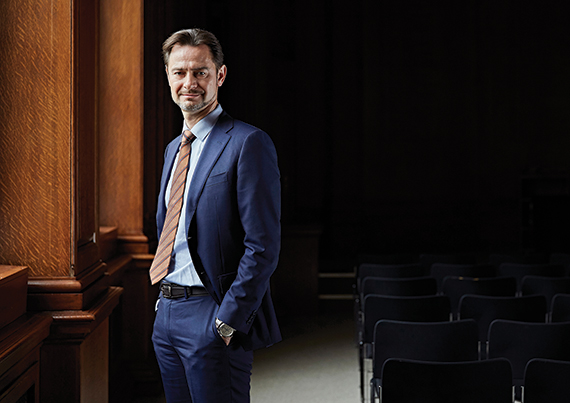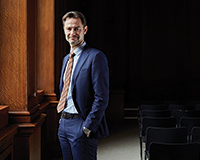 He is the man who pushed the global boundaries of one of the sector’s biggest industry bodies. And he’s a dab hand with a ukelele to boot. But just how much impact has Martin Brühl had as RICS president? Peter Bill finds out. Portrait by Tom Campbell
He is the man who pushed the global boundaries of one of the sector’s biggest industry bodies. And he’s a dab hand with a ukelele to boot. But just how much impact has Martin Brühl had as RICS president? Peter Bill finds out. Portrait by Tom Campbell
Google Martin Brühl. Nestled among the images of the suited and booted RICS president at work, in the boardroom and generally getting down to business, is a shot that stands out from the rest.
It might be grainy but it clearly shows the 48-year-old valuer, who oversees international business at German investment bank Union Investment, on stage rocking out in cargo pants and black T-shirt. He might not be thrashing a Fender Stratocaster, but a ukulele is not far off, right? Either way, this was not larking about. Brühl co-owns a music shop near Frankfurt. Musikhaus Taunus sells Stratocasters and ukuleles and, on the summer’s day back in 2011 when this photograph was taken, he was pushing sales with the help of 154 fellow players at an event to break the record for a mass strum-along.
And now another record is in the making: air miles travelled by a RICS president. On June 27, Brühl hands over the chain of office to EY’s Amanda Clack after a year in the job. He strode into RICS HQ on the day of this interview with a spring in his step, despite a sleepless overnight flight from America. In the past 12 months, he has travelled to the US, India, South Africa, Colombia, Mexico, Singapore and Hong Kong. Not all on RICS business. The ex-head of C&W in Germany until 2013 has a day job. Brühl attended to €5bn (£3.8bn) of deals for Union in 2015: there will be fewer this year, but more of that later.
His efforts were rewarded in December with a promotion to the board of Union, a Frankfurt-based open-ended property fund holding €28.5bn of assets under management in 24 countries. But the big question is what has he done for the 118,000 members and 80,000 students of the RICS scattered over 146 countries? Brühl says he’s helped promote global standard methods of measurement; hooked the organisation into the global investment world; raised the issue of ethics; but most of all, moved risk management up the agenda. How far has he pushed ahead on these key areas over his 12-month tenure?
The legacy
“Risk management has been the main theme of my presidency,” says Brühl, who has set up the acronym-defying RICS Global Real Estate Investment Risk Management Forum. Meetings have been held in New York, London and Singapore with 10 to 20 heavy hitters from global investors such as BlackRock.
“The forums shared best practice on state-of-the-art risk management and ethics,” says Brühl. Former US treasury secretary Larry Summers came along to the inaugural RICS World Built Environment Forum in Washington in early April, at which risk and ethics were on the agenda.
A draft of the ethics code was published mid-May amid much criticism from those who felt it does not go far enough. “What is the RICS going to do for members who do not work for the top six real estate advisers on conflicts of interest and wider competition issues?” asks an agent who wishes not to be named in case he is stigmatised. “It has become clear the top six now dominate real estate advice and, more worryingly, valuation advice.”
Smaller firms are “trampled on”, he says, quoting two instructions withdrawn after pressure was applied on the asset manager by the controlling fund – which has a close relationship with one of the big six.
To take an issue in the press and shout alongside others would not be very professional
“The RICS says we should complain to the Competition Commission. But who is going to dare complain? The British Medical Association defends all its members, not just those who pay the most money. So should the RICS. Incoming president Amanda Clack must tackle this issue in a sensible but head-on way to create a level playing field. If the RICS does not get this right in the UK, how can it hold its head up in the rest of the world?”
Brühl says that “most of the rules will be common sense”. OK, here’s one common sense question: why hasn’t this global public interest body for property commented on the Panama Papers? A leak of 11m documents that makes it perfectly clear that real estate is the vehicle of choice for global tax evasion?
Brühl turns defensive. “That would be premature; the papers have not been analysed. The RICS has to be careful not to jump onto a popular bandwagon, shouting about how shocked we are. As a public interest body, we have to prudently select the topics we talk about. To take an issue in the press and shout alongside others would not be very professional.”
Final ambitions
Wisdom gained from the forums will be shared with the world on 17 June, when the RICS plans to publish recommendations.
“Before my term expires, I want to show we care about this issue. We are trying to prevent the same mistakes happening again. It doesn’t mean we can prevent the next downturn. But we can help, through responsible investment, by being careful about liquidity management and preventing style drift.”
Style drift? Brühl explains: “Fund managers switching from prime to secondary locations. Something that happened in the past cycle and caused a lot of damage.”
If the vote is to leave, there will be a few years of uncertainty
A less contentious issue is the adoption of worldwide standard methods of measuring commercial and residential floor areas for investment purposes. Variations of up to 24% can occur because countries have different rules, says Brühl.
Three sets of standards are being developed by the RICS: one for property, one for land and one of construction. Members have to start using them from January.
Former RICS president Max Crofts of JLL has been labouring on the standards, primarily designed to allow meaningful investment benchmarks to be set across the globe. Home country members need not fear, as the changes will make little difference, says Brühl.
It’s a different story abroad. “As Union, we welcome this. We are in 24 countries and want to go up to 36. We use them and are pushing them into leases. They are very helpful for the day job.” And, one day, for the RICS. “We will, as a self-regulating body, ensure our members use them. But it will be a trickle-down effect and take some years.”
The Brexit issue
Five days before Brühl’s term ends, Britain votes to stay or leave the EU. He is worried.
“We have just closed a deal in Manchester, knowing very well 23 June will be an historic day. However, we have just pulled out of one forward funding deal in London. If the vote is to leave, there will be a few years of uncertainty.” He also betrays a sense of Union’s uncertainty.
“Last year we transacted €5bn, we bought €3.5bn of stock and sold €1.5bn. This year the plan is for €2-€2.5bn acquisitions and €1bn disposals. We don’t intend to repeat the record year of 2015.”
Brühl profile
Martin Brühl is coming to the end of his year-long stint as the 134th president of the RICS. The 48-year-old chartered surveyor hands over to EY partner Amanda Clack on 27 June. Brühl is head of international investment at Union Investment, a Hamburg-based open ended fund with €28.5bn under management. He shuttles between homes in London and Hamburg. Between 2007 and 2012, Brühl ran Cushman & Wakefield in Germany. He joined Union in 2013, ascending to the board in December 2015.
RICS profile
The institution has 118,000 full members, plus a roster of 80,000 students. A surplus of £826,000 on turnover of £75m was made in the year to July 2015. UK income was £58m; the rest of the world contributed £17m. There are 520 staff serving the UK, another 202 look after overseas members. The RICS has 3,200 members in the Americas, 17,000 in Asia-Pacific, 9,000 on the continent. Chief executive Sean Tompkins’ pay was £387,000 last year. Four other staff earned basic pay of between £200,000 and £250,000.











